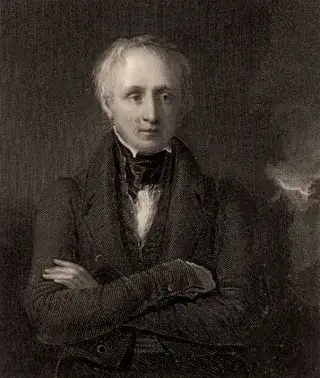Biography of William Wordsworth

| date | place | |
|---|---|---|
| born | April 07, 1770 | Cockermouth, England |
| died | April 23, 1850 | Rydal, England |
William Wordsworth stands as one of the most prominent figures of English Romanticism, renowned for his profound poetic exploration of nature, human emotion, and the sublime. Born in Cockermouth, Cumberland, Wordsworth experienced early loss with the death of his mother when he was just eight years old. Following her death, he was sent to live with relatives in the Lake District, an area that would profoundly shape his poetic sensibilities. Educated at Cambridge University, Wordsworth developed a passion for poetry and literature, immersing himself in the works of Milton, Shakespeare, and Spenser. It was during this time that he became increasingly interested in the political and social upheaval of the late 18th century, including the French Revolution, which inspired his early poetry. In 1798, Wordsworth, along with fellow poet Samuel Taylor Coleridge, published "Lyrical Ballads," a collection of poems that marked a significant shift in English literature. This collaborative work is often considered the manifesto of the Romantic Movement. Wordsworth's contributions to the volume, including "Lines Composed a Few Miles Above Tintern Abbey," reflected his belief in the power of nature to inspire and uplift the human spirit. Central to Wordsworth's poetry is his celebration of the natural world and its capacity to evoke profound emotional and spiritual responses in individuals. His poetry often explores themes of memory, childhood, and the passage of time, as well as the relationship between humanity and the environment. William Wordsworth's poetic philosophy is perhaps best articulated in his "Preface to Lyrical Ballads," in which he argued for poetry that is grounded in everyday language and addresses universal human experiences. He believed that poetry should speak to the common man and serve as a source of solace and inspiration in a rapidly changing world. Throughout his life, Wordsworth held various government positions and served as Poet Laureate of the United Kingdom from 1843 until his death. Despite these official duties, he continued to write poetry that resonated with readers for its sincerity, simplicity, and profound insight into the human condition. Today, Wordsworth's legacy endures, with his poetry continuing to captivate readers with its timeless themes and evocative imagery. His influence on English literature is immeasurable, and his works remain essential reading for anyone interested in the Romantic Movement and the power of poetry to illuminate the beauty and complexity of the world. William Wordsworth's poetry is a profound exploration of nature's beauty and the human experience, characterized by its sublime imagery and emotional depth. His poems transport readers to the serene landscapes of the Lake District, capturing the essence of the English countryside with vivid descriptions and evocative language. Themes of reflection, spirituality, and the interconnectedness of humanity and the natural world resonate throughout his works, making them enduring classics of English literature. From the iconic "Lines Composed a Few Miles Above Tintern Abbey" to the timeless ode "Daffodils," Wordsworth's poems continue to captivate audiences, offering timeless insight into the human condition and the wonders of the natural world.
Feel free to be first to leave comment.